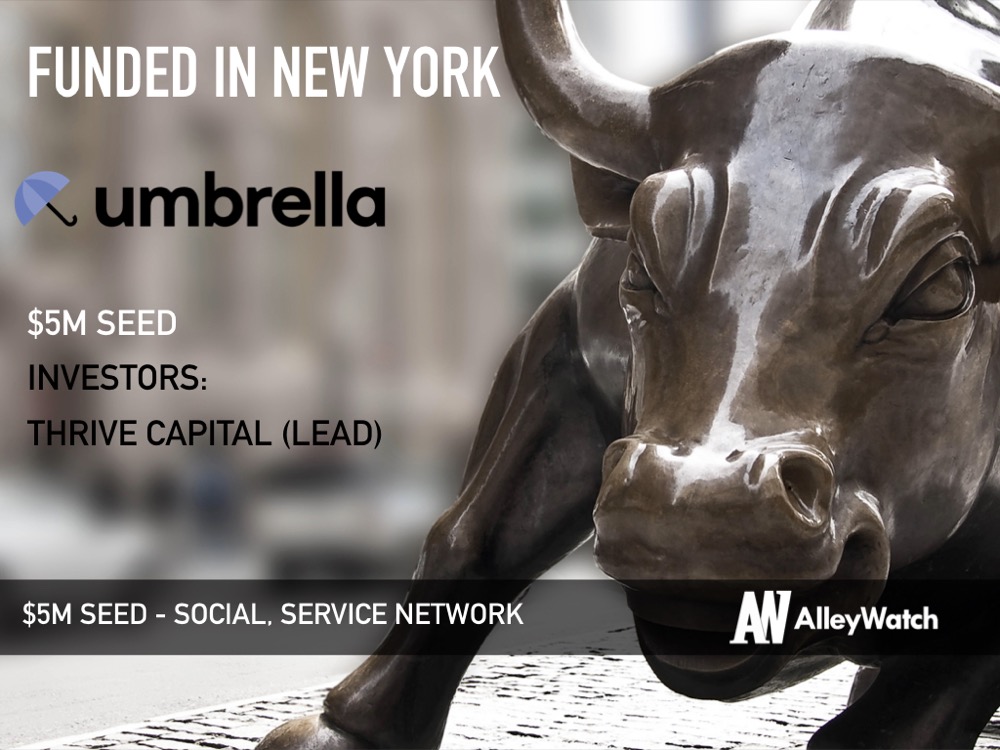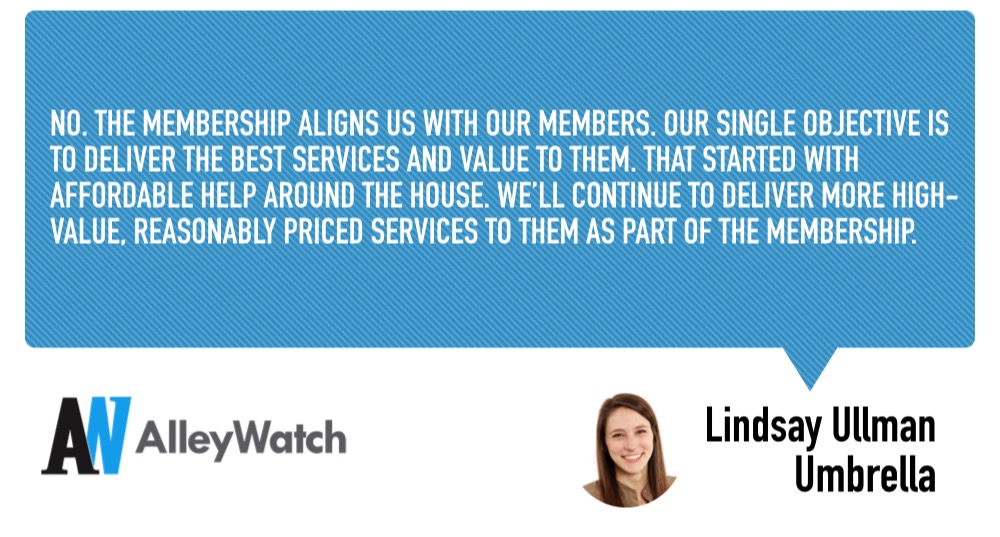Between 2006 and 2030, the US population of adults aged 65+ is expected to double from 37M people to 71.5M according to the US Census Bureau. This burgeoning demographic is influencing the types of companies that are being launched as this generation is becoming increasingly tech-savvy with 82 percent of this segmented already use a smartphone according to Senior Care. Umbrella leverages the mass adoption of smartphones and the internet to create an on-demand service network designed exclusively for its Members (65+ age group). For an annual membership fee of $199, Members are given access to a network of “Umbrella Neighbors,” triple-vetted folks in their community (half of whom are recently retired) who can help with a variety of tasks – from changing a lightbulb to organizing the pantry – around the house – no more waiting around for your children to visit. s“Umbrella Neighbors” receive a flat rate of $20/hour for being providers on the network.
AlleyWatch spoke to cofounder Lindsay Ullman about creating a company focused on helping one of the most overlooked demographics, Umbrella’s future plans, and recent round of funding.
Who were your investors and how much did you raise?
We raised a $5M seed round led by Thrive Capital with contributions from other top-tier venture funds such as Alexa Von Tobel’s Inspired Capital, Refactor Capital, Maveron, Collaborative Fund, Trailmix, David Tisch’s Box Group, and Alphabet’s Sidewalk Labs. Notable founders and operators also contributed to the round, including James McCann (1-800-Flowers), Alexa Hirshfield (Paperless Post), Heather Fernandez (Solv), Adrian Aoun (Forward), Halle Tecco (Rock Health), and executives from Uber and Stripe.
 Tell us about the product or service that Umbrella offers.
Tell us about the product or service that Umbrella offers.
Umbrella’s mission is to help older adults live independently with purpose in their own communities. Members have access to a network of “Umbrella Neighbors,” triple-vetted folks in their community (half of whom are recently retired) who can help with tasks around the house — everything from changing a lightbulb to mowing the lawn to organizing the pantry. We provide easy, trusted help for homeowners 65+, while creating purposeful work for recent retirees who want to give back.
What inspired you to start Umbrella?
Older adults are the fastest-growing demographic in this country. The vast majority want to stay in their own homes and communities as they age — and we don’t have good solutions for them, or their families. We knew there had to be a better way. So we spent months looking at what was out there and talking with hundreds of seniors about how they wanted to age and what they needed. And that’s how Umbrella was born.
How is Umbrella different?
We’re different in a lot of ways. First of all, we are a service company designed exclusively for the 65+ age group. Unlike other companies serving this demographic, we talk and market directly to our Members, not their kids. Secondly, I would say we are different because of the kind of “Neighbors” we attract to take on jobs through the Umbrella platform. These are skilled folks, mostly recent retirees, who are looking for a meaningful way to spend their time and give back to their communities. Lastly, we are building the future of distributed care for the aging market. A service like Umbrella allows older people to draw help from those around them so that they can remain in their homes and communities, where they prefer to be.
What market does Umbrella target and how big is it?
According to the U.S. Census, there are more than 50 million Americans 65+ today, and they will outnumber the kids in the U.S. by 2035. What’s more, 87% of older Americans say they want to age in their homes (AARP). So clearly, older Americans make up a huge portion of the economy, yet there is a serious lack of innovative companies, products, and services geared towards this group. In fact, Crunchbase estimates that <1% of companies receiving venture capital are aimed at the 65+ user.
What’s your business model?
Annual Membership fee of $199 to be able to service a community. From there, Members have access to our triple-vetted “Umbrella Neighbors” who can help out with anything around the house for a flat rate ($20/hour).
Do you foresee that in the future you will eliminate the annual membership fee and just focus on the hourly rate?
No. The membership aligns us with our Members. Our single objective is to deliver the best services and value to them. That started with affordable help around the house. We’ll continue to deliver more high-value, reasonably priced services to them as part of the Membership.
What was the funding process like?
It was intense. We tried to condense the process as much as possible, so we didn’t have to spend a huge amount of time fundraising (and even then, it’s a lot of work). Fortunately, we were able to partner with investors we’ve known for a long time and we’re honored to get to work with them to build this business.
What factors about your business led your investors to write the check?
Investors often ask “why now” – in other words, what is happening in the world that makes it possible for a big company to be built that might not have existed just a few years ago? I think the tailwinds they saw with Umbrella are the huge demographic shift as our population is aging, the overwhelming desire by older adults to stay in their communities, and their increasing technology adoption.
Hopefully, they also saw how passionate we were about serving this customer, and the early feedback we were getting as we were starting to develop Umbrella.
What are the milestones you plan to achieve in the next six months?
In the next six months, we are laser-focused on expanding Umbrella’s service area to as many communities as possible. We hear from our Members all the time what a game-changer Umbrella has been for them — allowing them to retain their independence and helping them to feel at ease in their homes. So we really want to bring this service to everyone who can benefit from it.
In the next six months, we are laser-focused on expanding Umbrella’s service area to as many communities as possible. We hear from our Members all the time what a game-changer Umbrella has been for them — allowing them to retain their independence and helping them to feel at ease in their homes. So we really want to bring this service to everyone who can benefit from it.
What advice can you offer companies in New York that do not have a fresh injection of capital in the bank?
If you’re trying to raise money and not getting very far, try to take a step back and look for the patterns of why investors are saying no. Are they highlighting an issue with the business or the approach? Is there some aspect they’re not really
understanding? You definitely don’t have to agree with the feedback — some of it will be noise! But try to use it to make your pitch and the business even stronger.
And in general, I’d say try to connect with a few founders who you can really trust and rely on. Starting a company is hard, and it’s so important to have others in similar places you can commiserate and celebrate with.
What’s your favorite restaurant in the city?
Maialino for breakfast, Colonie for their pork chop, and Prune for the best hamburger of my life (credit to my friend Sophie and her dad who just introduced me to it).





